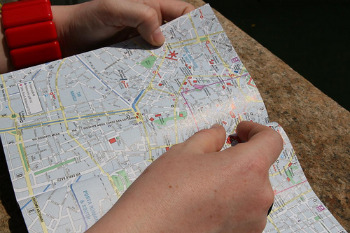 As you might imagine, there are themes that come up repeatedly with the questions I get via email, on my Twitter account, on the WhyGo Italy Facebook page, and as comments on various posts on the site itself. The most common theme, bar none, is this: “can you help me with my Italy itinerary?” The post with the most comments is my perfect 2-week Italy itinerary.
As you might imagine, there are themes that come up repeatedly with the questions I get via email, on my Twitter account, on the WhyGo Italy Facebook page, and as comments on various posts on the site itself. The most common theme, bar none, is this: “can you help me with my Italy itinerary?” The post with the most comments is my perfect 2-week Italy itinerary.
The question comes in many forms, from the “here’s what I think I’m going to do, what do you think of my plan?” to the “I have no idea where to start, can you point me in the right direction?” and everywhere in between. I answer every single one of them, and I love being able to help people plan their trips. I am, however, more of the “teach a man to fish” kind of person, so rather than spoon-feed itineraries to anyone I tend to offer suggestions that still require the questioner to make decisions. (I can’t help it, both my parents were teachers.)
Here’s the thing – I’ve realized that I’m giving out the same advice in terms of things to think about when creating the perfect Italy itinerary, so I decided it was about time I put those things in one article. I will say that these are my tips for creating the perfect Italy itinerary, and someone else is likely to have different tips. But since I have no plans of becoming a travel agent and booking everything for you, this is exactly the stuff I take into consideration when I’m planning my own trips – to Italy or anywhere else, for that matter.
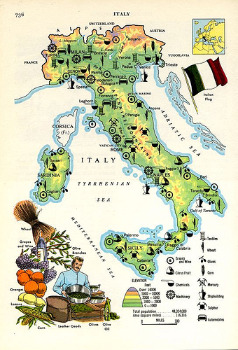 It may seem like a weird first step to get a good Italy map, especially if you’re not planning to drive anywhere in the country, but it’s key to the rest of the itinerary planning. The map doesn’t need to be big enough to carpet your living room or have every back road identified or anything, it just needs to have enough detail to show you city names beyond the big three, so you’ll have a point of reference for the places you want to go.
It may seem like a weird first step to get a good Italy map, especially if you’re not planning to drive anywhere in the country, but it’s key to the rest of the itinerary planning. The map doesn’t need to be big enough to carpet your living room or have every back road identified or anything, it just needs to have enough detail to show you city names beyond the big three, so you’ll have a point of reference for the places you want to go.
This isn’t the time to be realistic, this is the time to write down all the places you really want to visit on this trip. I mean, you can be a little realistic, because you’d get carpal tunnel if you wrote down the name of every single city and village in Italy because you wanted to get there “someday.” You probably already have an idea of a top five or top 10 places you’re really aching to see sooner rather than later, and you know how much time you have for your vacation. Don’t worry about getting it exactly right at this point in terms of number of places vs. amount of vacation time – that’s a later step.
Use pins, crayons, magic markers, post-it flags – whatever you like – just identify and mark all the places that on your list on your Italy map, so you can see exactly where they are in the country. This is why getting a good map is so important. It’s not enough to know that Naples is in “southern Italy” and Turin is in “northern Italy.” You have to know where in northern or southern Italy these places are.
This is critical for two reasons. First, it gives you an instant sense of what order to go in – moving geographically in one direction as much as possible cuts down on the amount of time you’ll spend in transit, while backtracking is (as I see it) just a waste of precious vacation time. (I even recommend getting an open-jaw ticket whenever possible to eliminate backtracking.) Second, it makes any cutting back on your destination wish list easier because you can see immediately what’s realistic and what’s simply not.
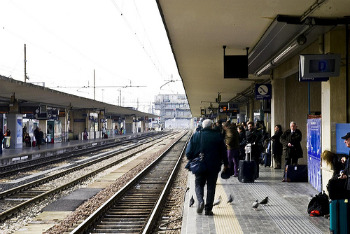 This is the part where I pay the Trenitalia site a visit and start typing in city names. If you think you’ll be renting a car in Italy and driving around, however, this is the part where you’d pay the Via Michelin site a visit instead. Obviously, both of these sites are giving you estimates for journey times, but it’s at least something to use as a reference point.
This is the part where I pay the Trenitalia site a visit and start typing in city names. If you think you’ll be renting a car in Italy and driving around, however, this is the part where you’d pay the Via Michelin site a visit instead. Obviously, both of these sites are giving you estimates for journey times, but it’s at least something to use as a reference point.
Why am I so insistent about this even before you’ve narrowed down your itinerary choices? Because I want you to know how long you’ll spend on each travel day in transit. I want you to keep in mind that just saying “on this day we’ll go from Rome to Venice” doesn’t mean the trip is over in a nanosecond, leaving you the whole day to explore Venice before jetting off to Verona that evening. Getting from place to place takes time, not to mention the time spent checking out of one hotel and into another on the other end. Skipping this step may mean that you end up with only a half-day in Venice when, in your head, you thought you’d have a whole day. And that would suck.
Now that you know where your desired stops are and how long it takes to get from point to point, bring in your actual allotted vacation time from stage left. I like to do this calendar-style, with big boxes for each day so I can see my trip progress; other people I know just make a list of the dates they’ll be traveling down one side of a piece of paper. Either way, start filling in each day with where you’ll be that day, and on any travel days make sure to note how long it takes to get from Point A to Point B (as per your research in step 4 above) so you’ll have a very good idea of just how long you’ll get to spend in each of the places you’re stopping in.
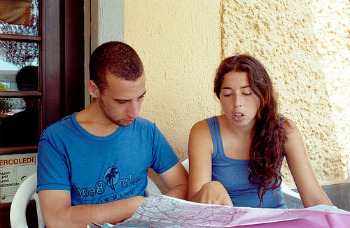 When you run out of days, as you are bound to do, then you’ll need to start cutting back (or adding vacation days, which I highly recommend, but which most people can’t do). How do you cut back? It’s difficult, I can totally sympathize – and it has to be done. Here are some ways to make it easier:
When you run out of days, as you are bound to do, then you’ll need to start cutting back (or adding vacation days, which I highly recommend, but which most people can’t do). How do you cut back? It’s difficult, I can totally sympathize – and it has to be done. Here are some ways to make it easier:
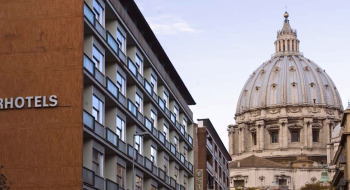 You might be more comfortable not booking accommodation before your trip, and if that’s the case that’s fine – but if you’re like me and you like knowing where you’ll be sleeping (especially on a shorter trip when you’d rather not spend time looking for a place to stay), this is now the part of the trip-planning process where you can start booking things.
You might be more comfortable not booking accommodation before your trip, and if that’s the case that’s fine – but if you’re like me and you like knowing where you’ll be sleeping (especially on a shorter trip when you’d rather not spend time looking for a place to stay), this is now the part of the trip-planning process where you can start booking things.
I know it’s tempting to start looking at pretty hotel pictures as soon as you make your wish list of places you want to go, but I hate it when I find an adorable B&B I absolutely must stay in and then it turns out I cross that destination off my list in the end. Once you’ve got your trip sorted out and know where you’re going and how long you’re staying, then it’s time to start looking for places to stay.
To get you started:
And there are more articles about hotels and hostels near specific landmarks in cities throughout Italy on the site – just click on any of the city names on the menu to the right, and then look in the right-hand column for titles like “Budget Hotels Near the Colosseum in Rome” or “Hotels Near St. Mark’s Square in Venice” to narrow down your choices in a flash.
Other articles you might find useful when planning your trip are my first-time visitor’s guide to Italy and this collection of Italy travel tips.
And after all of that, if you still want to ask me a question, feel free. Just know that I will still attempt to teach you to fish.
photos, top to bottom, by: alex_lee2001, enigmachck1, Alessandro Capotondi, [nivs], a hotel’s website